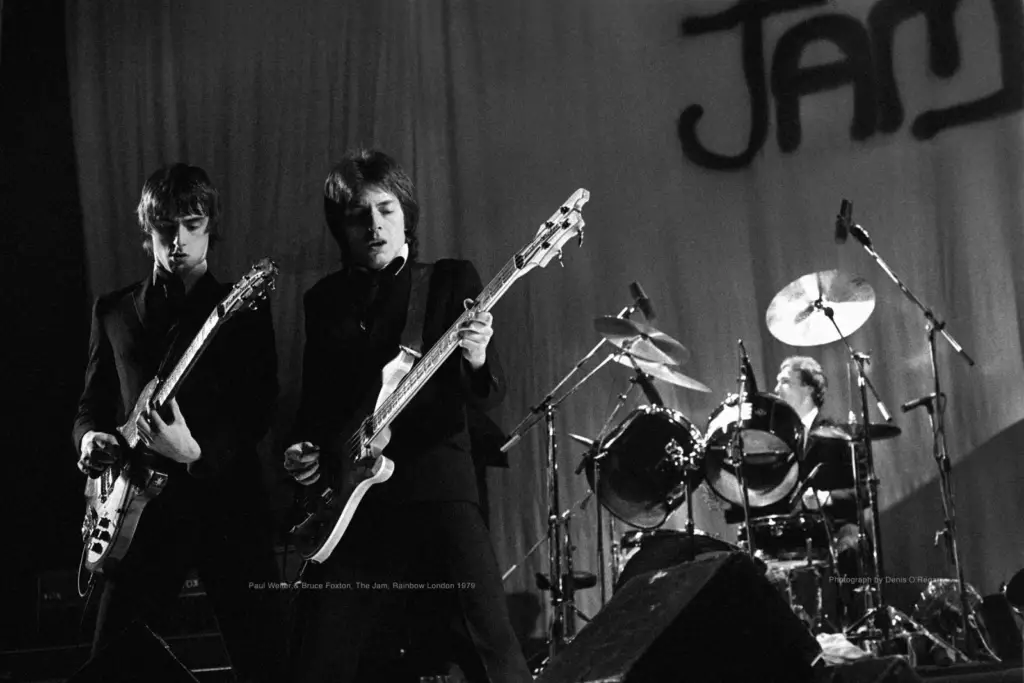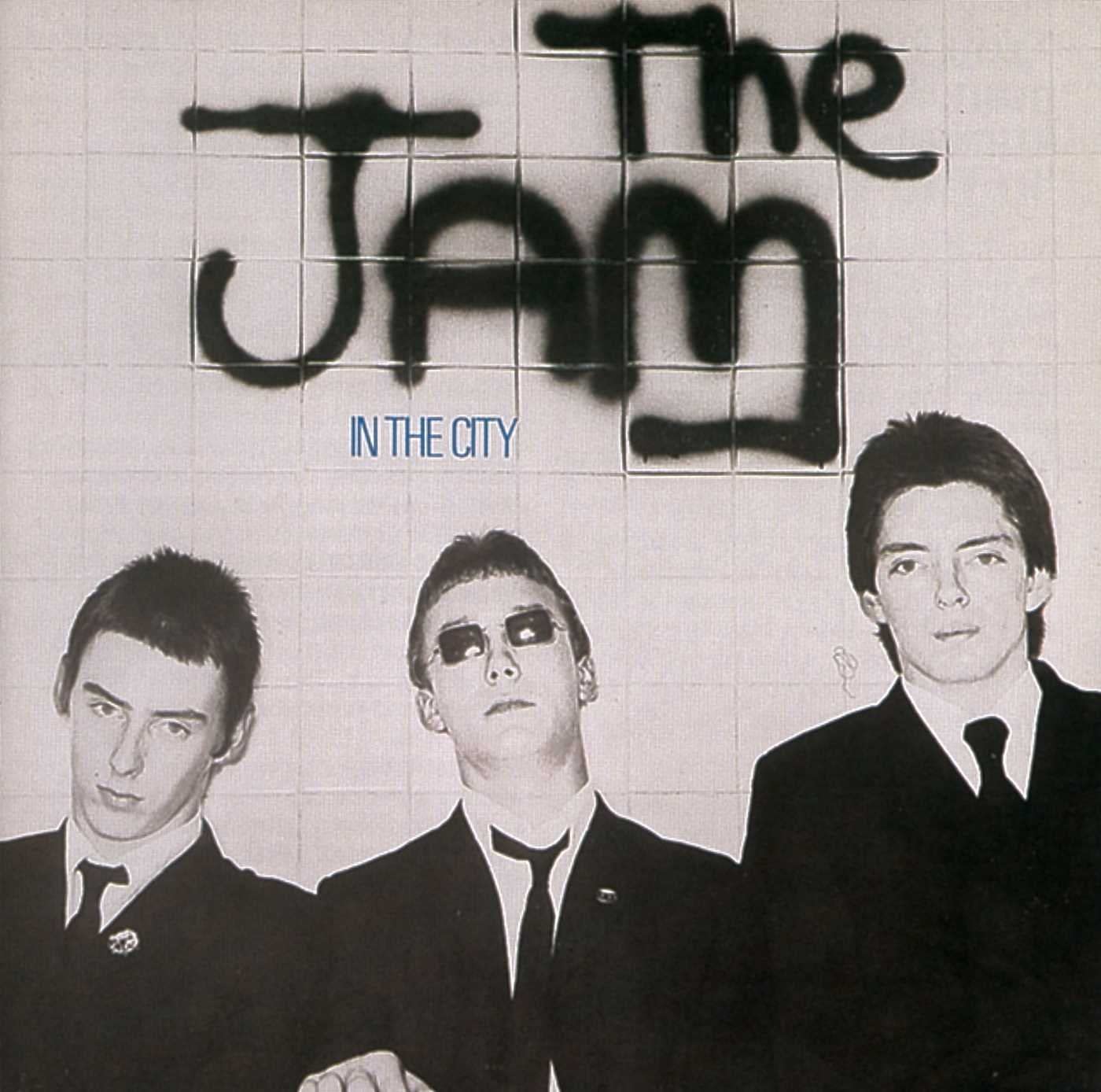History and Development of the Jam
The Jam’s journey begins in the early 1970s in the suburban town of Woking, Surrey, England. Paul Weller, a young aspiring musician, formed the band with school friends Bruce Foxton and Rick Buckler. Influenced by the burgeoning punk rock movement and the timeless sounds of 1960s mod rock, The Jam set out to carve their own path in the music scene.
In 1977, The Jam burst onto the scene with their debut single, “In the City,” a blistering anthem of youth rebellion that captured the raw energy and excitement of urban life. The song caught the attention of both critics and fans alike, propelling The Jam into the spotlight and laying the foundation for their meteoric rise to fame.
Buoyed by the success of their debut single, The Jam released their eponymous debut album later that year. Fueled by Weller’s sharp songwriting and the band’s relentless energy, “In the City” showcased The Jam’s potent blend of punk aggression and mod sensibility, earning them a devoted following among the youth subcultures of the time.
As The Jam’s popularity continued to soar, they released a string of hit singles and critically acclaimed albums throughout the late 1970s and early 1980s. Albums like “All Mod Cons” (1978) and “Setting Sons” (1979) showcased the band’s maturing songwriting skills and musical versatility, while hits like “Going Underground” and “A Town Called Malice” solidified their status as one of Britain’s premier rock bands.
However, by the early 1980s, tensions within the band began to mount. Creative differences between Weller and Foxton, as well as the pressures of constant touring and recording, took their toll on the group dynamics. In 1982, after releasing their sixth studio album, “The Gift,” The Jam announced their decision to disband, much to the dismay of their legions of fans.
Despite their relatively short-lived career, The Jam’s impact on the music world was immense. With their sharp lyrics, infectious melodies, and unwavering commitment to their artistic vision, they paved the way for future generations of musicians and left an indelible mark on British music history.
In the years since their breakup, The Jam’s music has continued to resonate with audiences around the world. Their songs, with their timeless themes of youth rebellion, social injustice, and the struggles of working-class life, remain as relevant today as they were when they were first penned.
From their humble beginnings in the suburbs of Surrey to their triumphant farewell at the height of their fame, The Jam’s journey is a testament to the power of music to transcend boundaries and inspire change. As long as there are disaffected youth and social injustices to rail against, The Jam’s music will continue to speak to the hearts and minds of listeners everywhere.
Type of Music
The Jam’s music is a vibrant fusion of punk, mod, and rock influences, characterized by its infectious energy, catchy melodies, and socially conscious lyrics. Drawing inspiration from the rebellious spirit of punk rock and the melodic sensibilities of 1960s mod rock, The Jam crafted a sound that was both timeless and distinctly their own.
At the heart of The Jam’s sound was frontman Paul Weller’s distinctively raw and emotive vocals. Weller’s gritty delivery, often tinged with a hint of soulfulness, gave The Jam’s songs a sense of urgency and authenticity that resonated with listeners. Whether he was railing against the injustices of Thatcher-era Britain or waxing poetic about the joys and sorrows of youth, Weller’s vocals were always front and center, driving home the emotional core of each song.
Backing Weller’s vocals were the tight, propulsive rhythms of Bruce Foxton’s bass guitar and Rick Buckler’s drums. Foxton’s melodic basslines provided the perfect counterpoint to Weller’s guitar work, adding depth and richness to The Jam’s sound. Meanwhile, Buckler’s crisp, precise drumming kept the band’s songs driving forward with relentless energy, providing the perfect foundation for Weller’s impassioned lyrics.
Musically, The Jam drew from a wide range of influences, incorporating elements of punk, R&B, soul, and even jazz into their songs. Tracks like “The Eton Rifles” and “Down in the Tube Station at Midnight” showcased the band’s knack for blending infectious melodies with incisive social commentary, while songs like “Start!” and “Pretty Green” demonstrated their ability to infuse punk aggression with mod sophistication.

One of The Jam’s defining characteristics was their unwavering commitment to their artistic vision. Unlike many of their punk contemporaries, who embraced a DIY ethos and shunned mainstream success, The Jam embraced their pop sensibilities and sought to reach as wide an audience as possible. This willingness to push boundaries and experiment with different musical styles set them apart from their peers and helped cement their status as one of Britain’s most beloved rock bands.
Key Personnel
The nucleus of The Jam consisted of three talented musicians: Paul Weller on vocals and guitar, Bruce Foxton on bass guitar and backing vocals, and Rick Buckler on drums. Weller, in particular, emerged as the band’s driving force, not only writing the majority of their songs but also shaping their artistic direction and image.
Essential Albums
- “In the City” (1977) – The Jam’s debut album burst onto the scene with raw energy and youthful rebellion. Tracks like “In the City” and “Art School” captured the frustration and excitement of urban life, earning the band a devoted following among the punk and mod crowds.
- “All Mod Cons” (1978) – Widely regarded as The Jam’s breakthrough album, “All Mod Cons” showcased the band’s maturing songwriting skills and musical versatility. From the blistering punk of “Billy Hunt” to the soulful balladry of “English Rose,” the album marked a turning point in The Jam’s career.
- “Setting Sons” (1979) – With its ambitious concept and thought-provoking lyrics, “Setting Sons” cemented The Jam’s reputation as one of Britain’s premier rock bands. Tracks like “The Eton Rifles” and “Thick as Thieves” tackled political and social issues with a newfound maturity and depth.
Essential Tracks
The Jam’s discography is a treasure trove of timeless classics, each track showcasing the band’s unparalleled talent for blending raw energy with melodic sophistication. From anthemic rockers to soulful ballads, The Jam’s essential tracks span the breadth of their musical evolution, capturing the essence of their iconic sound.
“Town Called Malice”
Arguably The Jam’s most enduring anthem, “Town Called Malice” is a blistering indictment of urban decay and disillusionment. With its infectious bassline, driving rhythm, and Weller’s impassioned vocals, the song perfectly captures the frustration and longing of working-class life in 1980s Britain. Its anthemic chorus and infectious energy have made it a staple of The Jam’s live shows and a perennial favorite among fans.
“Going Underground”
Released as a double A-side with “Dreams of Children,” “Going Underground” was The Jam’s first number one single in the UK charts, catapulting them to mainstream success. Its urgent rhythm and biting lyrics struck a chord with listeners, railing against conformity and commercialism with a sense of righteous indignation. Weller’s impassioned vocals and Foxton’s driving bassline combine to create a sense of urgency and defiance that is impossible to ignore.

“That’s Entertainment”
A poignant reflection on the mundanity of everyday life, “That’s Entertainment” showcases The Jam’s gift for storytelling and melody. Stripped-down and intimate, the song paints a vivid picture of urban life, from rainy streets to crowded pubs, with Weller’s evocative lyrics painting a picture of beauty in life’s simplest moments. Its haunting melody and heartfelt delivery have made it a favorite among fans and critics alike, earning it a place as one of The Jam’s essential tracks.
“The Eton Rifles”
A scathing critique of class privilege and social inequality, “The Eton Rifles” remains one of The Jam’s most politically charged songs. Inspired by real-life events, the song’s lyrics paint a vivid portrait of working-class frustration and anger, set against a backdrop of swirling guitars and driving rhythms. Weller’s impassioned vocals and incisive lyrics cut straight to the heart of the issue, making “The Eton Rifles” a rallying cry for disaffected youth everywhere.
“Start!”
With its infectious melody and driving rhythm, “Start!” is a classic example of The Jam’s ability to blend punk aggression with mod sophistication. The song’s upbeat tempo and catchy chorus make it a favorite among fans, while its themes of youthful rebellion and defiance resonate with listeners of all ages. From its infectious opening riff to its anthemic climax, “Start!” is a testament to The Jam’s enduring appeal and timeless sound.
In conclusion, The Jam’s essential tracks are a testament to the band’s unparalleled talent for blending raw energy with melodic sophistication. From anthemic rockers to soulful ballads, each track showcases the band’s unique musical vision and enduring influence on British music history.
Legacy and Significant Reviews
The Jam’s influence on subsequent generations of musicians cannot be overstated. From Britpop icons like Oasis and Blur to indie rockers such as The Libertines and Arctic Monkeys, countless bands have cited The Jam as a major inspiration. Critics have praised the band for their incisive lyrics, infectious melodies, and unwavering commitment to their artistic vision.
The Guardian: “The Jam’s music remains as vital and relevant today as it did in the tumultuous days of the late 1970s and early 1980s. With their potent blend of punk energy and mod sensibility, they captured the zeitgeist of a generation and left an indelible mark on British music.”
NME: “Paul Weller’s songwriting prowess and The Jam’s electrifying live performances set them apart from their peers. From the anthemic ‘A Town Called Malice’ to the introspective ‘That’s Entertainment,’ their music continues to resonate with listeners of all ages.”
Rolling Stone: “The Jam’s legacy as one of Britain’s greatest rock bands is firmly cemented in the annals of music history. With their razor-sharp lyrics, infectious hooks, and unparalleled stage presence, they blazed a trail for future generations of musicians to follow.”
Similar Bands
- The Who: With their explosive live shows and anthemic rock songs, The Who were a major influence on The Jam. Both bands shared a penchant for mod fashion and a rebellious spirit that resonated with audiences.
- The Clash: Another cornerstone of the British punk scene, The Clash’s politically charged lyrics and genre-blurring sound provided inspiration for The Jam’s own musical evolution. Both bands used their music as a platform to address social issues and advocate for change.
- The Kinks: As pioneers of the British invasion sound, The Kinks were a formative influence on The Jam’s musical style. Like The Jam, The Kinks blended elements of rock, pop, and British folk music to create a sound that was uniquely their own.
In conclusion, The Jam’s impact on the music world is undeniable. From their explosive debut in the late 1970s to their triumphant swan song in the early 1980s, they blazed a trail for future generations of musicians with their incisive lyrics, infectious melodies, and rebellious spirit. As long as there are disaffected youth and social injustices to rail against, The Jam’s music will continue to resonate with audiences around the world.
